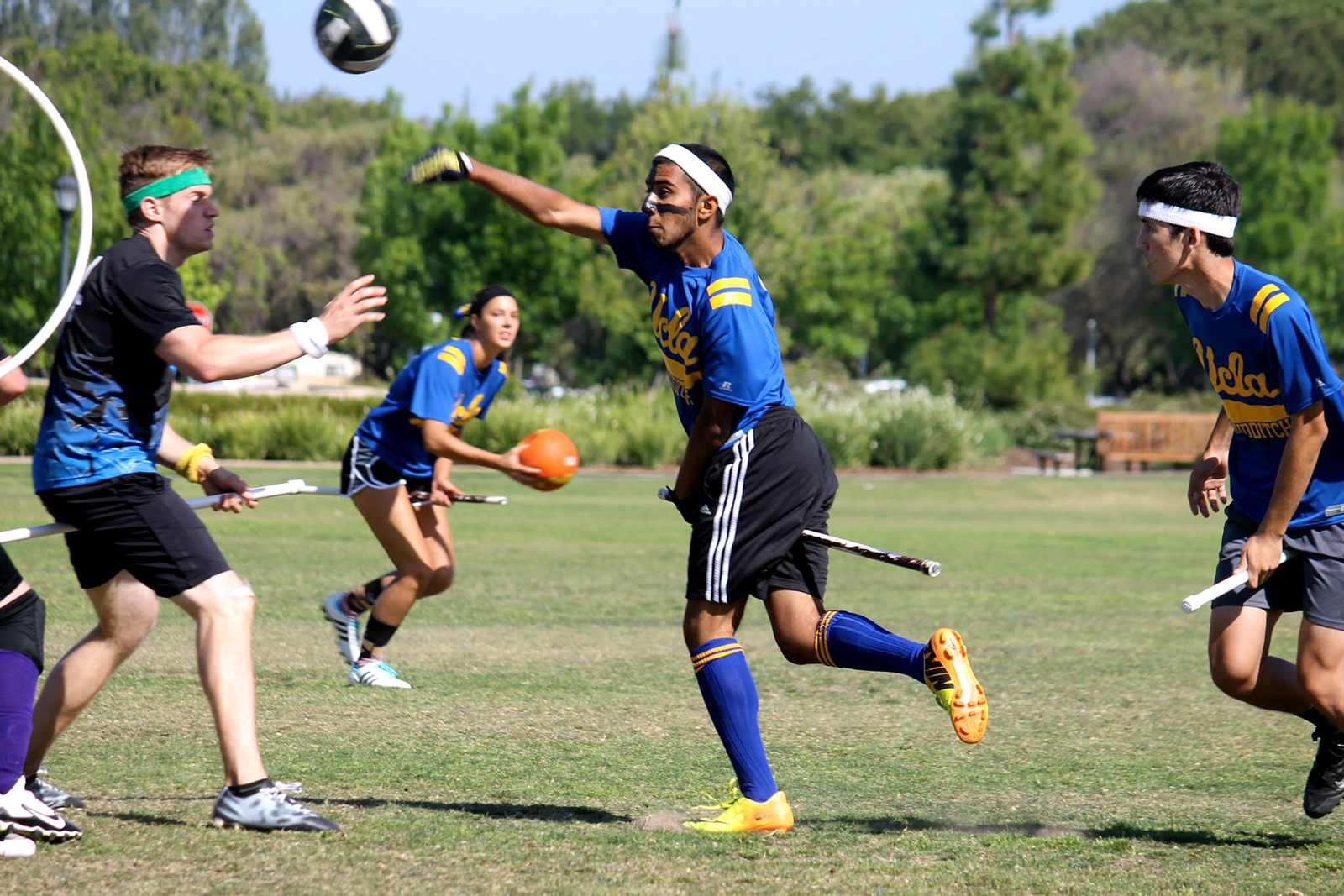UCLA club Quidditch teams chase competitive future, World Cup goals

UCLA Quidditch came to campus as a club in 2009, becoming an official club sport in 2010. Since then, the team has travelled to the World Cup four times.
(Courtesy of Badal Chandra)
By Kathryn Gallo
June 7, 2015 10:18 p.m.
They may not have gotten there by broomstick, but the members of UCLA Quidditch capped off their most successful season to date when they flew to Rock Hill, S.C. for this year’s Quidditch World Cup.
The trip marked the first time in school history that both the UCLA team and its sister team, Wizards of Westwood, which is also comprised of UCLA students, qualified for the championship tournament.
The road to the cup took them to Roseville, where the teams dueled it out against clubs from Arizona, California, Nevada and Utah in the West Regional Championship. With 22 teams in attendance, there was only room for 11 to earn bids to Quidditch’s biggest stage.
UCLA Quidditch safely secured its place in the top 12 with early wins against teams such as Arizona State and UC Irvine.
But it was the Wizards of Westwood who really stepped up for the Bruins. With an upset win against USC, UCLA’s second team earned an unexpected spot in the top 12, advancing to its first World Cup.
“One of the reasons that the second team was able to go to the World Cup this year is because we have so many people that compete at a high level,” said fourth-year ecology, behavior and evolution student Aislinn Dunne, who is a member of the UCLA Quidditch team.
That same level of competition was met in South Carolina.
The two-day tournament, which took place in April, featured 80 of the best Quidditch teams from across the United States and Canada. The teams were split into 16 groups with the winner of each group advancing to bracket play.
Neither Bruin team made it further than the group rounds. UCLA ended with a 2-3 record after defeating College of Charleston and The Southern Storm. The Wizards of Westwood finished 1-4, outplaying only the Western Washington Wyverns.
For second-year physical sciences student Chris Grant, however, it wasn’t the wins or the losses that he took away from the tournament. Grant said his favorite moment came at the beginning of the World Cup in the Opening Ceremonies. During the ceremony, all 80 teams were acknowledged as they gathered together on the main field to commence the start of competition.
“It was really a fascinating experience looking around and seeing how many people appreciate the sport and the community it is in,” Grant said.
It is a community that has grown since the game of Quidditch was first brought to reality at Middlebury College in 2005. The first Quidditch World Cup in 2007 featured just two teams.
Today, the sport has spread not only nationally, but internationally as well. Besides teams from the United States and Canada, teams from Europe also joined in the competition until a separate European World Cup was created in 2014.
At UCLA, there has also been an increase in participation and popularity.
When the UCLA Quidditch club was first started, less than 12 students signed up to take part – not enough to fill the roster for one team. Today, the team is officially recognized as part of the UCLA Club Sports program and has enough members to fill two teams, both of which play at the competitive level.
Dunne credits that growth to the physical demands of the game. What started as fantasy play to connect to the fictional world of “Harry Potter” has now evolved into a full-on athletic event.
“Quidditch is becoming more physical,” Dunne said. “When it started it was just a thing for ‘Harry Potter’ fans. Now, people play because they like the sport, they like the actual physical activity.”
Quidditch combines elements from dodgeball, rugby and tag. The players must keep a broomstick between their legs at all times as the chasers attempt to get a volleyball, called a quaffle, past the keepers and into the goal to score. This is all done while having to avoid the beaters, whose job is to hit the chasers with dodgeballs, temporarily knocking them out of play. Similar to any other contact sport, the game requires endurance and quick reflexes.
For third-year history student Javier Cervantes, the physical demands of Quidditch offered him an opportunity to get involved in athletics during his time in college.
“Quidditch caught me off guard because I didn’t know how athletic it was going to be,” Cervantes said. “When you start playing you realize that it’s physical and that it’s something you can actually get competitive in.”
Looking towards its next season, UCLA Quidditch hopes to continue to attract newcomers with its physical style of play. For the future, the team is striving to gain an even greater competitive edge, Grant said.
“The real goal for UCLA is to continue to expand competitively, and to really have both teams excel,” Grant said. “Maybe we can even win the World Cup.”



